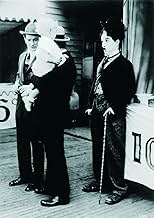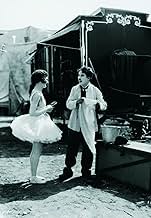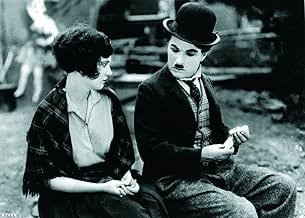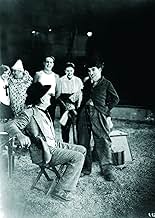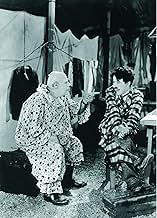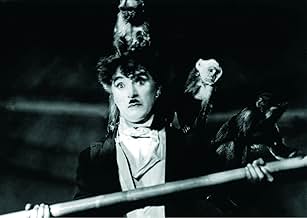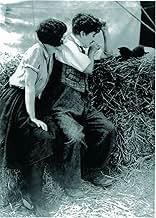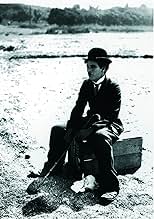IMDb-BEWERTUNG
8,1/10
37.730
IHRE BEWERTUNG
Der Tramp findet Arbeit bei einem Zirkus und das Mädchen seiner Träume.Der Tramp findet Arbeit bei einem Zirkus und das Mädchen seiner Träume.Der Tramp findet Arbeit bei einem Zirkus und das Mädchen seiner Träume.
- Regie
- Drehbuch
- Hauptbesetzung
- Auszeichnungen
- 3 wins total
Charles Chaplin
- A Tramp
- (as Charlie Chaplin)
Al Ernest Garcia
- The Circus Proprietor and Ring Master
- (as Allan Garcia)
Tiny Sandford
- The Head Property Man
- (as Stanley J. Sandford)
Albert Austin
- Clown
- (Nicht genannt)
Chester A. Bachman
- Cop
- (Nicht genannt)
Eugene Barry
- Cop
- (Nicht genannt)
Jack Bernard
- Man in Circus Audience
- (Nicht genannt)
Stanley Blystone
- Cop
- (Nicht genannt)
Heinie Conklin
- Clown
- (Nicht genannt)
Toraichi Kono
- Man in Circus Audience
- (Unbestätigt)
- (Nicht genannt)
H.L. Kyle
- Man in Circus Audience
- (Nicht genannt)
Betty Morrissey
- The Vanishing Lady
- (Nicht genannt)
Empfohlene Bewertungen
Although movie buffs seldom mention `The Circus' in the same breath as Charlie Chaplin's more touted masterpieces (`City Lights,' `Modern Times,' `The Gold Rush'), this film contains some of his best work manifested in a number of ingenious sequences. Chaplin once again dons the role of the tramp, this time having all sorts of adventures (and misadventures) under the big top.
In order to evade the police who suspect him of being a thief, the tramp ducks into a circus tent and acts as if he is part of the show. The cops follow him into the tent and try to apprehend him, with comical results. The crowd goes wild, believing all this was planned ahead of time. The audience's reaction is so strong that the tyrannical circus owner hires him on the spot. When it is discovered that Chaplin cannot be funny intentionally, the owner gives him a job as a prop man, clumsily lugging equipment around the tent as part of the show. Again the crowd roars its approval at his inadvertent antics, and soon the tramp is the circus' main attraction. In the meantime, he falls in love with the owner's daughter, a bareback rider who herself loves the tightrope walker, and romantic complications ensue.
`The Circus' is an all-around Chaplin effort. In addition to playing the lead role, he wrote, directed, produced and edited it, and composed the music as well. It is a meticulous production on all counts, with each sequence choreographed to elicit the maximum capacity of laughter from the audience. The scenes in which the tramp is pursued through a hall of mirrors, trapped inside the lion's cage, and forced to double for the missing tightrope walker stand alongside his finest achievements. The ending sequence is especially heartrending, as many are in his films. Here is a movie to be cherished by all fans of Chaplin, but appreciated even by casual viewers. This is because it achieves a rare blend of comedy and poignancy through appealing, sympathetic characters and with genuine honesty adding a note of realism to counterbalance the clowning.
In order to evade the police who suspect him of being a thief, the tramp ducks into a circus tent and acts as if he is part of the show. The cops follow him into the tent and try to apprehend him, with comical results. The crowd goes wild, believing all this was planned ahead of time. The audience's reaction is so strong that the tyrannical circus owner hires him on the spot. When it is discovered that Chaplin cannot be funny intentionally, the owner gives him a job as a prop man, clumsily lugging equipment around the tent as part of the show. Again the crowd roars its approval at his inadvertent antics, and soon the tramp is the circus' main attraction. In the meantime, he falls in love with the owner's daughter, a bareback rider who herself loves the tightrope walker, and romantic complications ensue.
`The Circus' is an all-around Chaplin effort. In addition to playing the lead role, he wrote, directed, produced and edited it, and composed the music as well. It is a meticulous production on all counts, with each sequence choreographed to elicit the maximum capacity of laughter from the audience. The scenes in which the tramp is pursued through a hall of mirrors, trapped inside the lion's cage, and forced to double for the missing tightrope walker stand alongside his finest achievements. The ending sequence is especially heartrending, as many are in his films. Here is a movie to be cherished by all fans of Chaplin, but appreciated even by casual viewers. This is because it achieves a rare blend of comedy and poignancy through appealing, sympathetic characters and with genuine honesty adding a note of realism to counterbalance the clowning.
The Circus was both my first silent film and the first film I've watched by Charles Chaplin. Being my first silent film i thought for sure i would be bored to death, but was i wrong. The film was really funny, made me laugh out loud. The comedy in this film is very different to the comedy in films now a days. Now a days most comedy films are big on the special effects and just lame humor. In the circus the actors have actual talent, they have to be very good at showing there emotion, like facial expressions and things like that.I was amazed on how well the movie was, Charlie Chaplin is great and i hope soon i can get my hands on some more of his films. I almost wish they could make a films like this today just maybe with some color, i think it'd be a great idea.
The Little Tramp is chased into a circus tent during a performance; his antics prove funnier than those of the clowns, and the ringmaster hires him for the show.
When a comedian plays a character who is inadvertently hilarious, it can seem narcissistic: just check out Jerry Lewis's "The Errand Boy" where Lewis has his supporting cast praise the comic genius of the character played by Jerry Lewis. Despite this danger, and despite Chaplin's off-screen egotism, the premise plays beautifully, especially since The Little Tramp (though not Chaplin) is such a terrible comedian when he's trying to be one. My favorite moment is when the ringmaster demands the auditioning Tramp to be funny right that instant: the Tramp grins and shyly dances around a bit, gingerly falls down, puts his cane between his legs and meekly lifts himself back up. "Terrible!" roars his would-be employer.
This film has more self-awareness over comedy conventions that any other Chaplin I know of. The Tramp ineptly (but hilariously) performs a couple of standard comedy routines with the other circus clowns. Later, there's a funny twist to the old banana peel gag; and near the end he crashes into an old general store, looking as if he's thrust himself back into his old Keystone days. This is Chaplin's last true silent film, and the Keystone moment feels like a nostalgic farewell to the past.
"The Circus" is funny throughout, but the opening scenes are probably the best. There's a marvelous funhouse sequence and a priceless routine where The Tramp pretends to be a motorized dummy. (Has anyone seen the Swiss clock routine from "Your Show of Shows"?) He also falls in love with the ringmaster's cruelly treated daughter, which leads to a poignant ending.
I enjoyed the music, which Chaplin composed for this film in 1969. His scores are always repetitive; but they're also sweet and funny and they enhance the action. I could have done without the title-sequence song (which he sings himself)—something about looking up at rainbows. Otherwise, this comedy is near-perfect and holds its own against Chaplin's even greater features, "The Gold Rush," "City Lights" and "Modern Times."
When a comedian plays a character who is inadvertently hilarious, it can seem narcissistic: just check out Jerry Lewis's "The Errand Boy" where Lewis has his supporting cast praise the comic genius of the character played by Jerry Lewis. Despite this danger, and despite Chaplin's off-screen egotism, the premise plays beautifully, especially since The Little Tramp (though not Chaplin) is such a terrible comedian when he's trying to be one. My favorite moment is when the ringmaster demands the auditioning Tramp to be funny right that instant: the Tramp grins and shyly dances around a bit, gingerly falls down, puts his cane between his legs and meekly lifts himself back up. "Terrible!" roars his would-be employer.
This film has more self-awareness over comedy conventions that any other Chaplin I know of. The Tramp ineptly (but hilariously) performs a couple of standard comedy routines with the other circus clowns. Later, there's a funny twist to the old banana peel gag; and near the end he crashes into an old general store, looking as if he's thrust himself back into his old Keystone days. This is Chaplin's last true silent film, and the Keystone moment feels like a nostalgic farewell to the past.
"The Circus" is funny throughout, but the opening scenes are probably the best. There's a marvelous funhouse sequence and a priceless routine where The Tramp pretends to be a motorized dummy. (Has anyone seen the Swiss clock routine from "Your Show of Shows"?) He also falls in love with the ringmaster's cruelly treated daughter, which leads to a poignant ending.
I enjoyed the music, which Chaplin composed for this film in 1969. His scores are always repetitive; but they're also sweet and funny and they enhance the action. I could have done without the title-sequence song (which he sings himself)—something about looking up at rainbows. Otherwise, this comedy is near-perfect and holds its own against Chaplin's even greater features, "The Gold Rush," "City Lights" and "Modern Times."
This is easily one of the best Chaplin Movies.It has a great sense of humour,very interesting cinematography and very well written characters.This movie contains some of the funniest gags I have ever seen in my life,and it is definetely one of the greatest comedies ever made.
The whole movie was very interesting,it kept from start to finish.The script had a very good structure,filled with great characters that become even more interesting due to some awesome acting by everyone.Also the ending is epic.Chaplin sympolises the circus as the cinema that is heading into a new direction,while the Trump(being obviously him is just not coming with them,and continues with his life like he used to).It is so clever,yet so simple.And that is the magic behind Chaplin.He uses music,characters,gags,to express himself and in the end make you cry.
Perhaps this doesn't have quite the reputation of Charlie Chaplin's greatest movies, but it is very entertaining, and it's a good showcase both for his comic genius and also for his skill as a film-maker. It's full of very funny routines along with plenty of action, with enough of a story to make you care about the characters, too.
The setting in "The Circus" certainly gives Chaplin a lot of ready-made material, and he makes the most of it, coming up with hilarious routines involving everything from a hall of mirrors to a lion. His 'Tramp' character gets involved in all kinds of amusing predicaments that involve several other interesting characters. Most of it keeps a pretty light tone, which makes the serious parts that much more effective. And there are several sequences which, though perhaps not as well known as some of the scenes from other Chaplin films, are quite funny and creative.
With plenty of humor and Chaplin's trademark sympathetic characters, this is a very enjoyable feature for anyone who appreciates classic comedy.
The setting in "The Circus" certainly gives Chaplin a lot of ready-made material, and he makes the most of it, coming up with hilarious routines involving everything from a hall of mirrors to a lion. His 'Tramp' character gets involved in all kinds of amusing predicaments that involve several other interesting characters. Most of it keeps a pretty light tone, which makes the serious parts that much more effective. And there are several sequences which, though perhaps not as well known as some of the scenes from other Chaplin films, are quite funny and creative.
With plenty of humor and Chaplin's trademark sympathetic characters, this is a very enjoyable feature for anyone who appreciates classic comedy.
Wusstest du schon
- WissenswertesIn the 1969 reissue, the 80-year-old Sir Charles Chaplin sang the title song.
- PatzerAfter the tramp washes the shaving cream from his face, he dries himself with a towel, but the towel never touches his face. (This is probably so that it won't mess up the stage makeup.)
- Zitate
The Circus Proprietor and Ring Master: Go ahead and be funny.
- Alternative VersionenCharles Chaplin replaced the original credits of this film when he reissued it in 1969. In their place, there is an opening scene featuring Merna Kennedy on the trapeze while Chaplin sings a song, then the image fades to the credits of that version with no cast nor technical credits.
- VerbindungenFeatured in The Circus: Premiere (1928)
Top-Auswahl
Melde dich zum Bewerten an und greife auf die Watchlist für personalisierte Empfehlungen zu.
Details
- Erscheinungsdatum
- Herkunftsland
- Offizielle Standorte
- Sprachen
- Auch bekannt als
- The Circus
- Drehorte
- Glendale, Kalifornien, USA(ending exterior scenes - the circus wagons depart south on Verdugo Rd. from Glenoaks Blvd.)
- Produktionsfirma
- Weitere beteiligte Unternehmen bei IMDbPro anzeigen
Box Office
- Budget
- 900.000 $ (geschätzt)
- Weltweiter Bruttoertrag
- 36.121 $
- Laufzeit
- 1 Std. 12 Min.(72 min)
- Farbe
- Sound-Mix
- Seitenverhältnis
- 1.33 : 1
Zu dieser Seite beitragen
Bearbeitung vorschlagen oder fehlenden Inhalt hinzufügen

